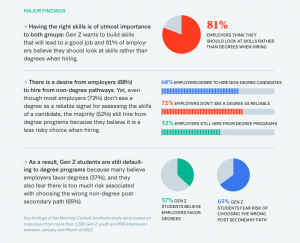This week, lawmakers in the House advanced newly proposed funding legislation for the upcoming 2024 federal fiscal year (FY24). Elsewhere, Senators have introduced new data and research legislation that would improve career readiness opportunities for learners.
 House Appropriators Advance FY24 Labor-HHS-ED Legislation
House Appropriators Advance FY24 Labor-HHS-ED Legislation
Lawmakers returned to Capitol Hill recently for a busy three-week work period ahead of Congress’ annual August recess. Topping the agenda is the need to address annual appropriations legislation for FY24 . The recent passage of the Fiscal Responsibility Act (FRA), which outlines topline spending caps for FY24 and FY25 that aim to roughly freeze federal funding at current FY23 levels, was widely expected to provide lawmakers greater clarity regarding how to move forward with this process.
Shortly after the passage of the FRA, however, House Republican leadership announced plans to move forward with a series of spending bills that further reduce federal spending to FY22 funding levels, rather than FY23 levels of investment as required by the FRA. Shortly after this announcement, Senate leaders outlined plans for FY24 which align much more closely with the requirements of the FRA. In practical terms, these divergent approaches to FY24 appropriations are putting Congress on a likely path towards conflict over the direction of federal spending later this year.
In recent weeks, the House and Senate appropriations committees have advanced legislation for roughly half of the dozen individual spending bills that compose the federal budget. Late last week, Republican leaders on the House Labor, Health and Human Services, Education (Labor-HHS-ED) Appropriations Subcommittee unveiled the text of their proposed FY24 Labor-HHS-ED appropriations bill–annual legislation which provides funding for programs like the Carl D. Perkins Career and Technical Education Act (Perkins V).* This legislation proposes an overall cut of 28 percent to the U.S. Department of Education’s (ED) budget when factoring existing appropriations that would be rescinded under the proposal and a 29 percent reduction in funding for the U.S. Department of Labor’s (DOL) budget. Despite these significant proposed reductions in funding, the legislation proposes to level-fund Perkins V’s basic state formula grant program at existing FY23 levels.
Concerningly, however, the bill would dramatically reduce and in some cases entirely eliminate a slew of education and workforce development programs overseen by ED and DOL that intersect with or otherwise complement CTE. For instance, Title I funding from the Every Student Succeeds Act (ESSA) would be reduced by 80 percent, while core Title I funding for the Workforce Innovation and Opportunity Act (WIOA) would be reduced by more than half of current funding levels. While Advance CTE appreciates Congress’ recognition of continuing to invest in Career Technical Education (CTE), these proposals would significantly disrupt the ability of schools, districts, and institutions to provide high quality learning opportunities for all students. In light of this, Advance CTE and partners issued a statement opposing this proposal and calling on the House to reverse course on this approach to FY24 funding.
On Friday, the House Labor, Health and Human Services, Education Appropriations Subcommittee marked up and advanced this legislation along party lines. Timing for comparable appropriations efforts in the Senate regarding their Labor-HHS-ED bill are still forthcoming. Regardless, both chambers will need to reconcile differences between these visions for FY24 funding in the coming weeks and months, before the formal start of FY24 on October 1. As these efforts continue to move forward, Advance CTE is closely monitoring the process and engaging with partners on Capitol Hill to ensure the funding needs of the CTE community are realized as part of the ongoing budget and appropriations process for FY24.
*As amended by the Strengthening Career and Technical Education for the 21st Century Act
Senators Introduce CTE Data Bill
Last Thursday, Senators Baldwin (D-WI), Young (R-IN), and Kaine (D-VA) introduced the Data for American Jobs Act (S. 2290). This legislation would make a series of updates to the Education Sciences Reform Act (ESRA) to increase the law’s focus on CTE and more closely align state data systems and related federal investments to increase data transparency and quality. “Achieving career success for every learner through CTE requires actionable, transparent and trustworthy data. Advance CTE is pleased to support the Data for American Jobs Act, which takes important steps to leverage national research efforts and resources to promote a better understanding of CTE and advances modernized and interconnected data infrastructure for states,” said Kate Kreamer, Advance CTE’s Executive Director, upon the introduction of the legislation. The legislation comes ahead of potential consideration of ESRA by the Senate Health, Education, Labor, and Pensions (HELP) Committee expected later this Congress.
P3 Pilot Applications Announced
Recently, the U.S. Department of Education’s (ED) Office of Career, Technical, and Adult Education (OCTAE) issued a notice inviting applications for selection as a Performance Partnership Pilots for disconnected youth (P3). This pilot authority has been authorized by Congress since 2014 and is aimed at better supporting disconnected youth populations by allowing ED and other federal agencies to waive certain requirements of existing federal funding streams like ESSA, Perkins V, and other similar investments. In doing so, recipients of these funds can braid and blend federal resources more easily, allowing for greater coordination of services for these populations. More on the announcement, including how to apply, can be found here.
Energy Department Announces School Infrastructure Funding
In recent weeks, the U.S. Department of Energy announced $178 million in new grant funding it has made available to local school districts in 22 states via the Renew America’s Schools grant program. This grant program was created as part of the bipartisan infrastructure law passed by Congress and signed into law by President Biden. The program aims to help schools and districts make improvements to facilities that improve energy efficiency and foster healthier learning environments. More information about the grants can be found here.
Steve Voytek, Policy Advisor


 As
As 
